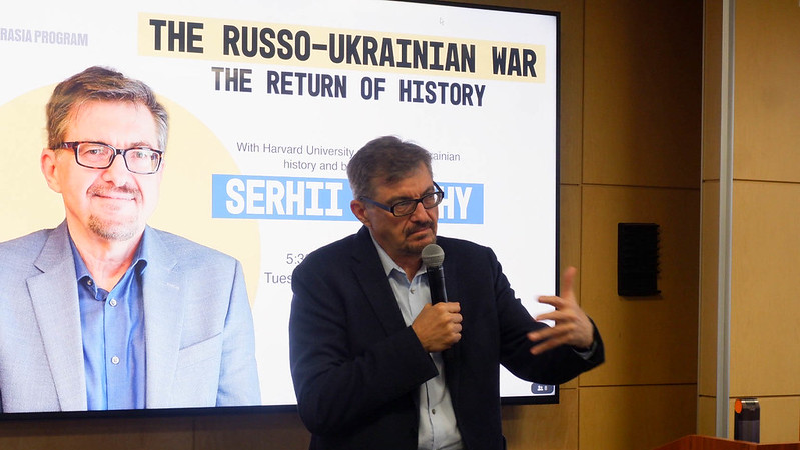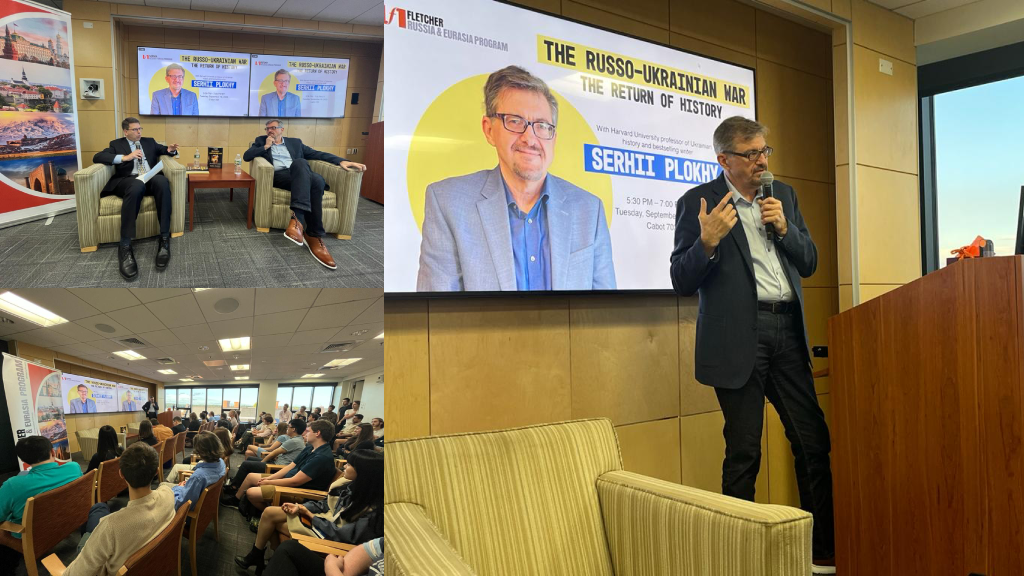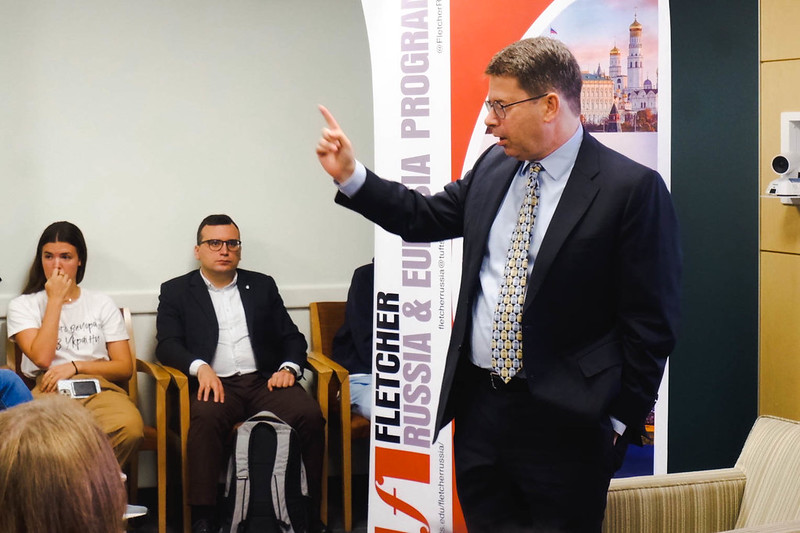
Serhii Plokhy and the Imperative of Responding to History
By Natasha Wood, MALD 2024 Candidate, The Fletcher School
On September 19, 2023, the Fletcher Russia and Eurasia Program hosted historian Serhii Plokhy to discuss his recently published book “The Russo-Ukrainian War: The Return of History” (2023). Plokhy, whose research focuses on Ukrainian cultural and intellectual history, is the director of the Harvard Ukrainian Research Institute. Daniel Drezner, Co-Director of the Russia and Eurasia Program and Professor of International Politics at Fletcher, moderated the event.
During the talk, Plokhy discussed the genesis of the book, its primary themes, and the current state of the Russia-Ukraine war.
“When I was approached by my publisher on whether I would want to write a book on the war…I said definitely not,” remembered Plokhy. He cited his reasons as both the emotional toll of the war and the challenge of attempting to write a history of the conflict as it unfolded. Unlike Plokhy’s recent work, including “Lost Kingdom” (2017) and “The Last Empire: The Final Days of the Soviet Union” (2015), this project would analyze the war without knowing how it might end.
Ultimately, however, he decided to move forward with the book. “That war, rhetorically and otherwise, is rooted in history unlike any other war that I’ve read about, written about, or am aware [of],” he commented. He reflected on the deep historical roots of the conflict and Vladimir Putin’s pseudo-historical essay “On the Historical Unity of Russians and Ukrainians,” published in July 2021.
“There was a narrative that was presented [in Putin’s essay] that was justifying from the historical point of view…what I certainly consider to be a crime,” said Plokhy.
The historical analysis he presents in “The Russo-Ukrainian War” is an attempt to counter the weaponization of history as employed by the Kremlin throughout the conflict.

Plokhy discussed the key themes in the book, including chronology, geography and geopolitics, the role of ideas, and the context within the global order. He emphasized the importance of remembering that the war started in March 2014 before moving into the Donbas. He also pointed out that the war was dismissed by many as a hybrid war, which to a certain extent relieved the international community of the obligation to take the kind of action required by a full-scale war. Plokhy also outlined the critical pre-conditions for the war, including turning points in 1914 and 1991.
Speaking about the treatment of Ukraine during the Russian Revolution, Plokhy pointed out, “Unlike what the politicians and ideologues of the Russian Empire wrote, thought, and believed, Ukraine was not one of many tribes of the big Russian nation. Ukraine was a separate nation, and the Bolsheviks admitted that.”
Plokhy also described how the book grapples with 21st-century geopolitics pertaining to Ukraine. The book reminds the reader that the trigger for Russia’s 2014 invasion of Crimea was Ukraine’s decision to sign an EU association agreement, which precluded them from joining the Eurasian Economic Union.
In reference to Putin’s 2007 Munich Security Conference speech, Plokhy pointed out that at the time, “For Russia to emerge as the center of the multipolar world between China and the EU, one thing becomes extremely important: reestablishing control over resources of the post-Soviet space.”
Despite this effort, Russia’s influence today in the broader post-Soviet space is weakening. In reference to Azerbaijan’s military victory in Nagorno-Karabakh, Plokhy pointed out that Russia’s troop commitments in Ukraine have contributed to Armenia’s inability to defend its claim to Artsakh. Finland’s accession to NATO and Sweden’s NATO bid have substantially extended Russia’s border with NATO, and the war has rallied the transatlantic alliance.
Separately, Plokhy drew parallels with the Sino-Soviet alliance of the 1950s, suggesting that a role reversal has now put China in the driving seat of the relationship. While Russia’s inability to quickly win the war is bad for China, it also presents a strategic opportunity for China to prevent the Biden administration’s intended pivot eastward.
Drezner asked about implications for Russia and Ukraine should Ukraine win the war, paraphrasing Zbigniew Brzezinski’s quote, “Russia with Ukraine is an empire; Russia without Ukraine is a country.” Plokhy reiterated that Russian democracy did not stand much of a chance and that a tradition of democracy cannot be established overnight. He suggested that nationalism, which is one of the most powerful forces in Russia at the moment, presents a major threat to the Putin regime. In the case of a Ukrainian victory, a best-case scenario is that Russian nationalist pressure, combined with hundreds of thousands of coffins returning from Ukraine, forces Russia to see itself as a country and not an empire.
The best case scenario for Ukraine, Plokhy argued, is based on continued momentum around Ukrainian integration into the EU, NATO, and other Western structures. This will be conditional on effective Ukrainian democratic governance, and the threat of authoritarian rule in Ukraine is real. Plokhy, however, made the argument that the longer the war goes on, the more likely it is that power will continue to be increasingly centralized in Ukraine. He closed with a cautionary reminder, paraphrasing Yevhen Hlibovytsky: “If you want to save Ukrainian democracy, provide weapons and provide them now.”

